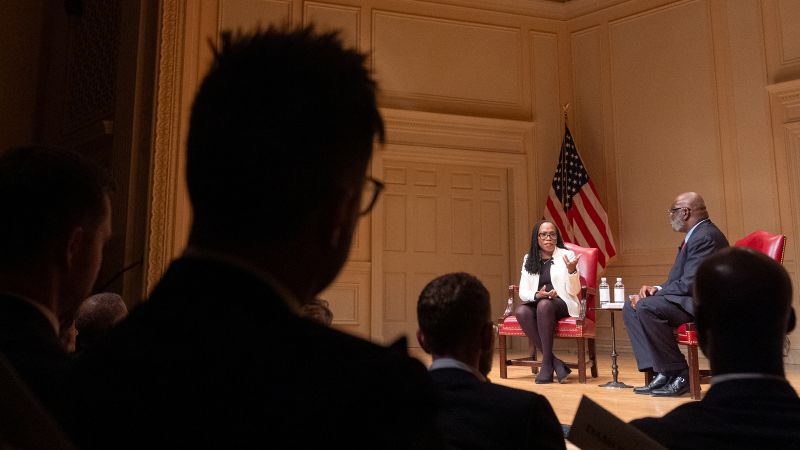Justice Ketanji Brown Jackson’s approach to dissenting opinions has sparked controversy due to her use of a candid and, at times, derisive tone. In her expressions, she has labeled her colleagues as “hubristic and senseless,” utilizing sarcasm to drive her points home. This linguistic boldness has not gone unnoticed, especially in an era when the Supreme Court is under heightened scrutiny amidst the complexities of the Trump administration’s policies.
Notably, Jackson is not alone in adopting an outspoken style on the bench. Her predecessor, the late Justice Antonin Scalia, was renowned for his sharp repartee and memorable quips, earning him a reputation as a master of the put-down. For instance, he infamously described the majority’s reasoning in one of his 2013 decisions as “legalistic argle-bargle.” This historical context demonstrates that the dynamics of communication within the Supreme Court have evolved, reflecting individual justices’ personalities and the current political landscape.
The ongoing national dialogue about judicial communication emphasizes the importance of how dissenting opinions resonate with the American public, particularly in light of the judicial system’s response to the Trump agenda, which many perceive as aggressive and controversial. Jackson’s dissent against the majority’s ruling on birthright citizenship showcased this dynamic vividly. She characterized the court’s decision as a misalignment of power, indicating that rather than a lawless executive, it was the district courts deemed power-hungry.
Dissents in the Supreme Court often delve into complex legal arguments, making them challenging for laypeople to grasp. Therefore, Jackson’s conversational tone could serve to make her positions more relatable, drawing attention outside of legal circles. For example, phrases like “wait for it” and “full stop” pepper her dissenting opinions, eliciting polarized reactions.
Conversely, these informal elements can provoke criticism, with detractors arguing that such rhetoric detracts from the gravity expected in judicial language. This pattern of critique is not new; Scalia, during his tenure from 1986 to 2016, faced similar backlash for his uniquely candid style, which often highlighted his conservative viewpoint in stark contrast to the more liberal perspectives of his contemporaries. For instance, Scalia infamously expressed his disdain for Justice Anthony Kennedy’s prose regarding same-sex marriage decisions, stating he would rather “hide my head in a bag.”
In the current climate, the interplay of judicial language and public perception becomes even more crucial considering the intense scrutiny of the Supreme Court’s rulings. With social media amplifying controversies, Jackson’s word choices appear mild compared to the loud political discourse of today. Yet, legal scholars stress that judicial writing traditionally trends towards being excessively staid and often inaccessible, making Jackson’s more engaging and colloquial approach noteworthy.
The effectiveness of this approach, however, remains divided; while it garners attention and interest, it can also lead critics to dismiss the substance of her arguments in favor of critique over form. Observations note a correlation between the content of dissenting opinions and their reception; those inclined to critique Jackson’s style often align along conservative lines, while her supporters celebrate her willingness to speak out against perceived injustices.
Moreover, public interest in the Supreme Court has surged, particularly regarding its potential role in counteracting governmental overreach. Dissenting justices, including Jackson, have exploited this renewed focus to bring their positions into sharper relief, utilizing more ordinary language to articulate their concerns. For instance, Justice Sonia Sotomayor’s dissent, which summarized that “other litigants must follow the rules, but the administration has the Supreme Court on speed dial,” encapsulates a growing frustration within liberal circles regarding perceived inequities in legal treatment.
With Jackson being the newest justice on the court, appointed by President Joe Biden in 2022, she remains in a unique position, wielding significant influence despite her relative lack of seniority. She has actively sought to ensure her voice is heard, speaking and writing more frequently than many of her colleagues while promoting her memoir.
However, her foreboding predictions raise concerns about the future of the rule of law in America; she has warned that the court’s actions could contribute to a “culture of disdain” for lower courts, engendering a potential breakdown of trusted government institutions. In a specific dissent regarding Trump’s actions toward birthright citizenship, Jackson asserted that the majority’s stance might exacerbate this crisis.
Perhaps more strikingly, her dissents have not always gained traction among her fellow justices, with colleagues such as Sotomayor and Elena Kagan frequently opting not to join her in her more provocative statements. For example, during a contentious disagreement on the Alien Enemies Act, Jackson’s harsh critiques of the majority were left unsupported by her dissenting peers.
Such dynamics illustrate the intricate balancing act justices must maintain; while dissenting opinions inherently convey divergent perspectives, the tone and language employed can influence not only judicial discourse but also inter-judicial relationships. Judicial commentator











